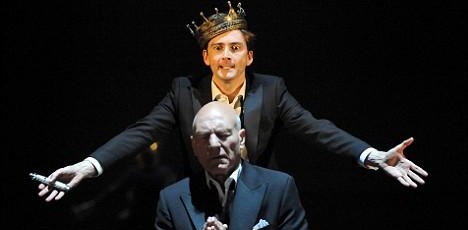by Christina Carmosino (Circle 3)
While in class today, the discussion about the established patriarchy and then subsequent challenges to the patriarchy was intriguing to me. The power relations within the play seem almost at times contradictory because at one moment, Shakespeare establishes a norm related to a patriarchal society– such as Egeus’ desire for power over Hermia– yet in the next scene he attempts to dismantle the established norm by introducing such ideas as Titania’s refusal to obey Oberon in regards to giving up her boy. I believe this is intentional by Shakespeare in an attempt to have the reader question the effectiveness of the patriarchy and how it does or does not have influence over the characters in the play. Living in a society ruled by an unmarried queen, such as Shakespeare did during Queen Elizabeth’s reign, these questions would often come into play in the real world and naturally, into the realm of Shakespeare’s imagined worlds.
First in the play, the patriarchy is established as ruling by Thesus and Hippolyta’s impending marriage and then Egeus’ display of power over his daughter Hermia. The establishment of male power is subtle at first with Thesus hinting to a conquest of Hippolyta by stating “Hippolyta, I wooed thee with my sword / And won thy love doing thee injuries” (1.1 16-17). Theseus conquered Hippolyta in battle, and is speaking of her as if she was an item to be won, rather than a woman to be wooed or loved. The patriarchal ideal becomes more established when it is revealed that Hippolyta is an Amazonian woman, whose history includes an all female society with strong warriors. The fact that Hippolyta was most likely not interested in men in terms of romance indicates that perhaps she might have not approved of the marriage she was about to partake in. Though there is no mention of her dissent for her marriage, there is no indication that she is excited either.
Shortly after the exchange between Thesus and Hippolyta, Egeus comes in demanding a solution for his “complaint” against his daughter. Here, the patriarchal norms come to the forefront, with Egeus asserting his dominance as a man over his daughter by wanting to control her desires and “dispose of her” as he pleases (1.1 42). Theseus quickly agrees with Egeus, telling Hermia “To you your father should be as a god”—a clear establishment of power for men over women (1.1 46). Hermia attempts to contradict the men she is speaking to with little avail; the patriarchal norms dominate over her thoughts and wishes.
However, this patriarchal tone which is established at the play’s beginning quickly is complicated with the introduction of the fairy world and Titania. Titania deviates from the other women introduced so far as she attempts valiantly to have her own destiny as that defies men’s expectations of her. Oberon assumes if he wills it, she will give him her child for his needs, and is taken aback by her defiance and assurance that she will raise the child on her own as a promise to another woman. Though both Hermia and Titania challenge the patriarchy, Titania is more openly defiant in that she directly stands up for her thoughts and beliefs while Hermia runs away from her father to the woods where the rules of Athenian government, and subsequently the patriarchy surrounding it, do not apply to her.
Going forward, I hope to see more non compliance from the women of the play in their attempts to dismantle the patriarchy and create their own destinies. It seems likely that Titania will continue her path against Oberon while Hermia’s story is more unclear.
